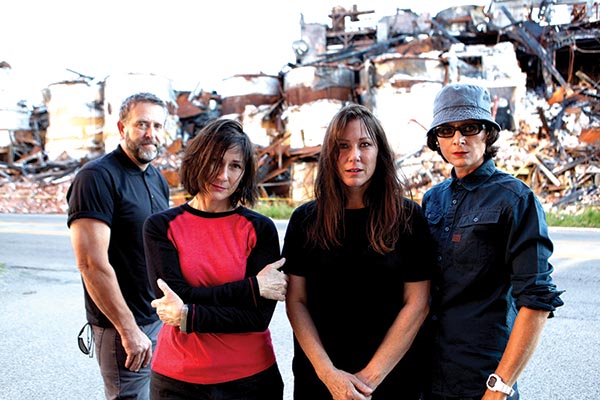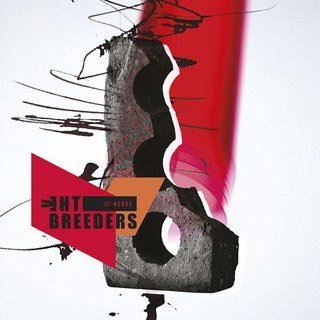The Breeders


The Breeders have a new album coming. It’s heavy, but when you stop and listen to any one member, their playing is clear and tuneful. Their music has weight, but sounds effortless. It’s palatable, that is to say “refined,” as in “perfected over time.” If you are capable of listening without nostalgia, or if you haven’t really dug into The Breeders, I think you too would appraise All Nerve as one of The Breeders’ finest and coolest albums.
The title track, engineered by Steve Albini, cuts to the bone. It’s too good. On All Nerve, they sound like the old Breeders, but the old Breeders were a band that did whatever they wanted. The righteously concise “All Nerve” ends and kicks in the talk-sung industrial psychedelia of “MetaGoth,” Then rolling into the dreamy, miniature epic, “Spacewoman.”
The Breeders we have today are not the first incarnation of the band, but the version that made Last Splash (1993), the album that (to date) has been the band’s biggest mark on the world. It was that album’s 20th anniversary tour (and accompanying seven-disc vinyl re-release) that brought these four musicians back to the basement. This album doesn’t sound like a sequel, but it was clearly formed in the same sonic universe.
As my call was transferred to The Breeders (the Deal twins, Kim and Kelly, as well as their bassist Josephine Wiggs, minus their drummer, Jim Macpherson), they were joking about producing live hold music. There was a moment of pure insanity, in which I speculated that their label 4AD recorded bands talking about hold music to serve as actual hold music, but when I said “Hi,” The Breeders answered.
ELEVEN: It helps that one of you has a British accent, but could I get everyone to say their name and anything else so I can transcribe this correctly?
Josephine Wiggs: I want everybody to speak in their best British accents now.
Kelly Deal: I’m Kelly. This is Kelly speaking here.
Kim Deal: I’m Kim. Kim. Kim. Kim. Hello, hello.
11: Kim and Kelly sound very similar, but different. It’s more the delivery that’s the same than the voice.
Kelly: It’s because life hasn’t beaten me down yet, so I have a little more optimism, maybe? [Kim cracks up at this]
11: It’s been ten years since the last Breeders album. Where did All Nerve come from? Are these new songs?
JW: Yes. They are—well, what do you mean by “new?”
11: I guess I don’t know.
JW: They are a mixture of things. Some of them really are quite new, and some are ideas that Kim had knocking around for a while. And one of them, “Walking with a Killer,” is a song that Kim had previously recorded as part of her solo series. Both Kelly and I liked the song very much and suggested that we do our own version of it.
11: That one stuck out to me because it sounded like the band was a little jammier than other songs on the album. It’s a good example of Kim’s singing, which makes me feel like you don’t care about something, but I should care about it. You sing, “I didn’t know it was my time to die, but it really was” like it’s no big deal. I’m wondering, who are your favorite singers?
Kim: I like Sarah Vaughan very much. I think she’s got a very nice tone–she had a nice tone. I like the ones that everybody else likes. I like Doris Day and Ella [Fitzgerald].
11: Are you a Lou Reed person?
Kim: Yes I like him, yes I do. Although… yeah. I like the way he sings.

11: Am I correct that it’s a sculpture of a key on the album cover? Is that how you see it?
JW: I don’t think so.
Kim: That’s weird. Let me look at that. Ohhh. I know what you’re talking about. To me it always looked like the letter “B.”
11: That does make more immediate sense.
Kim: You know, the key is cool, though. That was cool. I never thought of it like that.
11: Josephine, Wikipedia tells me that you hold two degrees in philosophy.
JW: It’s true.
11: Does that have any bearing on your life in music?
JW: Oh, I think so. You always like to ask questions about things. Some people might say it’s being contrary, but I do have a kind of inquisitiveness, not just accepting things for how they seem.
11: Are there any parallels you can draw between philosophers you like and musicians you like?
JW: I like things that are instinctively themselves, rather than just genre pieces. I like individuality and I would say “uniqueness,” but that’s a terribly overused word.
11: Are there any band roles or band superlatives that everyone would agree on like “the funny one” or “best siblings” or something?
JW: We’re all funny.
Kelly: Yes, that’s true.
Kim: I’m the easy-going one who’s always right. [band laughs]
Kim: What are you guys?
JW: I’m the thoughtful one that’s always right.
11: Do you guys always agree?
JW: What do you think?
Kim: Sometimes we do agree on certain aspects. I think there are a lot of times we agree. 50% of the time we agree. That’s what Kim’s saying. What do you think of that?
JW: That’s not bad.
Kim: Kel?
Kelly: I’ll go with that.
Kim: See? That’s an example of us agreeing on something.
11: Yes, a consensus.
JW: That’s not a bad average either, when you think about it. It could be much worse, couldn’t it?

11: Oh, much worse. So The Breeders are back in their 1993 lineup. What’s different or what’s stayed the same?
Kim: This is not something I thought about when we got back together to work on the Last Splash material, but, when we started doing the interviews, it occured to me. We’re in the same rehearsal space in my basement in Dayton, OH, in the same house. I’m using the same guitar. I’m using the same amplifier. Jim’s using the same drums. Kelly’s using the same amp and the same guitar. Josephine is using a different head, same cabinet. You’re still using a Music Man, but it was a different style then, right?
JW: Yeah.
Kim: It’s really quite amazing that we managed to sound different than 1993. Yet we did.
11: There must be differences coming from somewhere, so what’s different?
Kim: I don’t know… Jim brought a Vistalite set into our group and that was interesting. He was usually on the Gretsch. We recorded a couple of songs with the Vistalite and you liked them very much, didn’t you, Josephine?
JW: Yeah, I liked it very much. I think time is different now. I feel like, back in the day, you felt like there was just a kind of infinity ahead of you. But now I know that that’s not true and I feel that that’s not true. I feel a little bit affected by that, and so I really try to enjoy the moment and make the most of it. [The Deal twins agree] Knowing that it’s not going to last forever, you make the most of the positive things about it and the opportunity to do it and all that, which I don’t think I felt so keenly back in the day as I do now.
11: When you say that, is that feeling like a sense of urgency just to appreciate it, or is it also about trying to get as much done as you can?
JW: No, I don’t think that there’s a rush to get as much in as you can because I don’t think you can rush things. I really don’t. I think things have their own momentum and even though sometimes I wish it could be a bit pacier, that’s not what I mean really. It’s more… I don’t know. Your perspective changes a bit.
11: How much of the album was recorded with the band playing live in a room together?
JW: Well, depends how you look at it. In some ways I’m going to say all of it because the backing tracks, the drums and the bass, were done with everybody playing. And then other things were overdubbed on top of that. The songs were performed as songs––they weren’t constructed piecemeal. But then, obviously, when you’re recording in the studio you take advantage of the fact that you can do another take of something, repair mistakes and such.
Kim: We would end up overdubbing guitars. We had Kelly in a cramped closet-y hallway sort of thing because we have to watch out that our amps aren’t too loud so that they’re blistering the room drum microphones with too much sound—I mean a little blend is okay I guess, but that’s not where we were at. So Kelly would have a little less of a volume so she’s not coming through the door into the microphones. My vocal would be overdubbed and even my guitar. I played the scratch tracks with my headphones falling off in a cramped space, just to get the rhythm parts down.

11: Were you able to see each other as you played? It sounds like you were kind of in your own boxes.
Kim: Yeah, I was behind a sliding glass door. Jim’s out in the main room. Kelly could see if she wanted to. Josephine you were sitting out in the room.
JW: Yeah, I was sitting next to Jim so I could see him.
Kim: But her bass amp was in a walled-off room some other place. I don’t play a rhythm instrument so I didn’t have to really see everybody and vibe with them. I was in my own area. But I ended up keeping––not all of it you guys, but––I did keep a lot of those tracks, which is good.
11: There was more than one engineer and more than one studio involved. I don’t know if there was a favorite, but were there any remarkable combinations of engineer and studio or any big differences when you went from one to the next?
Kim: We started with two songs that we knew we liked. We approached Steve Albini’s studio in Chicago and had him record us. That was “All Nerve” and “Skinhead #2.” Then [laughs], Josephine and Kelly were like, “This analog stuff is fine but I don’t really care. I like digital recording anyway and this is very expensive.”
So we kind of played around with digital recording, and we got one song in Dayton from a digital place, just a little basement, and that was “Dawn: Making an Effort.” And that’s when I said to them, “Yeah this is cool, but I don’t really like digital for recording rock drumming.”
Kelly: We were just looking at that for demos originally.
11: Steve Albini was involved with earlier Breeders albums too, right?
Kim: He recorded Pod in Edinburgh in 1989, in like December. Wasn’t it December, Josephine?
JW: I think it may have been the very beginning of 1990.
Kim: And he also recorded Title TK. That album came out in 2002. And then I think we did some recording together for Battles.
11: That’s a pretty good spread.
Kim: Steve Albini is like family. I vacation with him. We’ve gone to Hawaii with them. He had us play at their wedding.
11: How has he changed over the years?
Kim: Hmm… that’s a good question. I don’t know. He still has a nice head of hair.
11: How did Courtney Barnett wind up singing backing vocals on “Howl at the Summit?”
Kim: Me and Courtney were asked to do this thing called Talkhouse. It’s where artists get on the phone and ask each other questions and they record it. We had a good time talking, and afterwards we shared each other’s email and began emailing each other. And we kept in contact. Not a whole lot, just “Hey, how’s it going?” that sort of thing. And they were in town. She said, “Hey we’re in Ohio, do you guys want to come to the show?” And I said “Can’t go to the show, we’re in the studio. You have a day off—do you guys want to swing by the studio and check it out?” This is the third studio we’d been to, the one in Dayton, Kentucky. We did most of the recording there. And they said, “Sure.” So her, and Bones––wasn’t that the other guy’s name? [It was—Bones Sloane.] And even the tour manager got into… [a phone clicks in and a distinct “meow” derails Kim’s story]
Kelly: Sorry. My cat helped me hang up.
11: What’s your cat’s name?
Kelly: Blackberry.
11: Mine is Cecilia.
Kelly: Tell her Blackberry says hi.
11: If someone is “All Nerve,” is that a good thing or a bad thing?
JW: Yes and no.
11: Is it “nerve” like “facing something scary” or nerve like “feeling nervous?”
JW: …yes.
Kim: I think that it would be a bad thing. I think the person in that song is crazy.
JW: The song, yes, but the album?
Kim: Oh! That’s interesting. I don’t know.
JW: If it’s the song then it’s a bad thing, but if it’s the album it’s a good thing.



